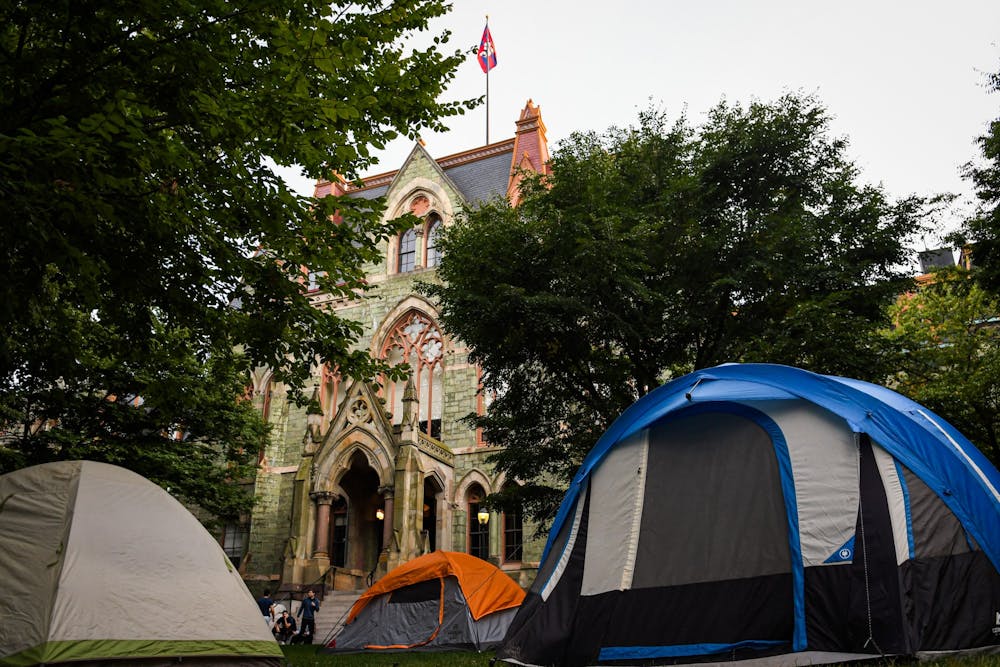
Nearly one month after students first set up their tents at this semester's Fossil Free Penn encampment, FFP members remain on College Green despite recent abysmal weather conditions and many students' departures from campus during fall break last weekend.
FFP's encampment, which began on Sept. 14., features three demands for the University: a public commitment toward preserving the UC Townhomes, complete fossil fuel divestment, and making payments in lieu of taxes, or PILOTs, to Philadelphia public schools. Since the start of the encampment, FFP coordinators have told The Daily Pennsylvanian that they do not plan on leaving until Penn has publicly met all three of their demands.
Even though the majority of Hurricane Ian’s damage affected Florida and other areas near the Gulf of Mexico, many in Philadelphia were also impacted by its rains.
FFP coordinator and College sophomore Eug Xu said that students partaking in the encampment took storm preparations “very seriously.” After hours of taking down posters, tarps, and other loose items, Xu said that students consolidated their encampment to just four tents set up against the side of College Hall to minimize the force of wind and rain.
“We had seven people sleeping in a four-person tent,” Xu said. “It was a little crowded, but we had a lot of fun.”
Xu said that the following days of continued rain were rough, but it was important to FFP that the encampment remained on College Green and continued to spread its message.
“We wanted to make sure that campus knew that we were not gone. We were just protecting the physical safety of the encampment,” Xu said.
FFP coordinator and College junior Katie Francis said that camping through the storm was a bonding experience for the group and a testament to their commitment.
“We were not risking our health,” Francis said. “We took breaks, of course, but we were willing to be outside in a hurricane because we care so much about this.”
Xu said that facing the effects of Hurricane Ian was “poetic." They said that this is the type of natural weather phenomenon that is only exacerbated by climate inaction.
“There was never a moment in my head when I said, ‘This is the moment that we go home,’” Xu said. “This is a fundamental part of why we are here, and we're going to stay through that. This is the stuff that we're willing to stick through.”
Francis added that those at the encampment are willing to weather the elements because they “feel like change is going to come, and it is going to happen soon.”
Even through fall break, Xu said that coordinators planned out who would be willing to stay on campus to be in charge of the encampment. They said that while numbers were lower during the break, they were able to continue to foster a community on College Green.
The encampment has continued to partner with local environmental justice-focused organizations and global groups advocating for total fossil fuel divestment, according to FFP coordinators.
FFP coordinator and College sophomore Sabirah Mahmud is a strategy organizer for Philly Thrive — an organization fighting for environmental, racial, and economic justice in Philadelphia. Philly Thrive has supported FFP’s encampment and participated in their press conference last month. Mahmud said that the encampment’s demands are in line with advocacy work that other Philadelphia organizations have been fighting for.
“FFP’s demands for Penn are a part of a larger struggle happening across the city,” Mahmud said. “Penn can set a massive precedence for global divestment and even inspire the city.”
Xu said that FFP has also worked with End Fossil, an international youth-driven organization advocating for climate justice worldwide. Xu said that sitting in meetings with students across the globe has allowed them to better understand how Penn fits into the larger picture of climate inaction.
“It is not just local,” Xu said. “There are people in Portugal, Germany, Italy, Egypt, in the Congo, the United Kingdom, and across the U.S. that know about us and who have seen us. It is miles ahead of where we were before.”
Despite the weather conditions, students said that they have no plans to leave the encampment until their demands are met. Mahmud said that as someone who grew up in University City, she knows how constant climate inaction has been “detrimental and traumatic” to her community.
“I feel much more motivated to keep the encampment going and showing up, even when it is difficult,” Mahmud said.
The Daily Pennsylvanian is an independent, student-run newspaper. Please consider making a donation to support the coverage that shapes the University. Your generosity ensures a future of strong journalism at Penn.
Donate







